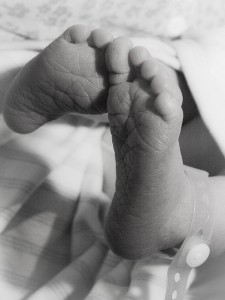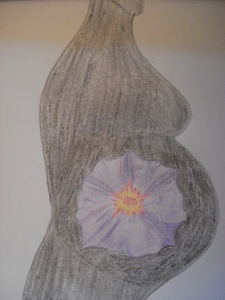
This says,"I am Muslim, and I love my Christian brothers and sisters."
Men kept touching me. They have this way of reaching out in the middle of a crowd and brushing your body in inappropriate places without ever looking your way. Then you doubt yourself, because no one looks like they did it on purpose. But it’s too targeted and personal to be an accidental touch.
I had only been in Bahrain about a year, but I knew that none of my friends were having this problem with guys. I was doing everything I could to dress and behave modestly and appropriately. But it kept happening.
One night I was home alone and the doorbell rang. We had an intercom, like everyone else, but I couldn’t understand the person on the other end. I went out my front door and unlocked the gate to find a Pakistani man standing there. “Give chance. Give chance,” he said. I thought he wanted to wash my car.
After several attempts to communicate, he asked, “Russia?” “No…America,” I answered, puzzled. I closed the gate, and by the time I got inside it dawned on me—he thought I was a Russian prostitute. I was stunned, and also ashamed and nervous. Why would he think I was a prostitute? Was he watching the house to know that I was alone? Was I safe? Were there others?
Several days later he came back. I ran up to my roof to see over the wall and confirm that it was him again. I called my neighbor, a Bahraini man with several daughters who I knew would help. He called the police and came over and held onto the man until the police came. I was really shaken. And all the police questioning makes you feel like it’s your fault.
Funny, even writing this now, I wonder, will people think this was my fault? I felt that shame much more back then–because women often feel that way, because Middle Eastern culture tends to put responsibility on the woman in these kinds of incidents, and maybe mostly because I was trying so hard not to draw attention to myself, to be above reproach in that culture.
As these incidents added up, they started to weigh on me. I was nervous. My stomach would knot when I pulled up behind a truck full of Pakistani workers. The stares unnerved me. I felt jumpy dealing with men at shops or in the souq.
After a while, some ideas started to rise up inside of me. Two Bible verses became mantras to me, not just to say them, but to imagine them. One was “The name of the Lord is a fortified tower; the righteous run to it and are safe.” (Proverbs 18:10) I would imagine God as a tower with strong walls all around me, and it helped me to feel safe. The other verse was “But you, Lord, are a shield around me, my glory, the one who lifts my head high.” (Psalm 3:3) In many ways the hijab, or veil, is a symbol of honor and protection for a woman.* But my physical coverings didn’t seem to be doing their job. So with this verse I actually pictured God wrapping a cloak around me that hid me from those who wanted to take advantage of me. The part about God being the lifter of my head helped me let go of some of the shame I had been feeling.
These practices, done consistently every time I felt uncomfortable or frightened helped me recover a feeling of safety and security. But that wasn’t enough. I wanted to move from feeling protected to actively loving. So there was another component to my practice. As is often the case, my fears had generalized to all men of similar ethnic origins. So it wasn’t just a handful of people who hurt me that I was now afraid of—it was lots of people. So every time I felt uncomfortable I would ask God to bless those people that I was afraid of—I would try to desire from my heart that God would do good things for them.
Recently I have been thinking about how negative experiences with a few people can grow to become anger toward and fear of a whole group of people. It happens all over the world, but my heart particularly aches when I see this happen between Muslims and Christians.
Individual hurts have taken place when Americans have been affected by terrorism, when Muslims have been bullied or hurt by hate crimes, when people from each group try to convert each other in disrespectful ways, and when we assume the worst about each other. But those hurts that happen on an individual level, or on a small-group level become culturally ingrained fears, prejudices, and inability to love.
There is no magic formula for overcoming these hurts, because they affect us each individually in different ways. I shared my story as just one example. For me, the emotional touch points were fear and shame. It’s important for each person to invite healing into their lives in a way that is personally meaningful, in the way that your gut tells you you most need it, and then to turn around that healing toward the people who hurt you, even toward their whole ethnic or religious group.
My story ends with a dramatic, but not immediate transformation. I had to keep the practice up for a significant period of time before I noticed that I was settling into a feeling of safety and love again, but it was a big change from the fear and anxiety that I had been experiencing.
Do you have stories of seeing this kind of change happen in you? Do you have experiences that you would like to see turned around from hurt to love? Tell us about it in the comments.
*Note: Yes, there are ways the hijab can be used negatively as well—it is a mixed bag that is experienced differently by different women, but I think it’s important to understand that it can have positive connotations.
Photo by Gigi Ibrahim








